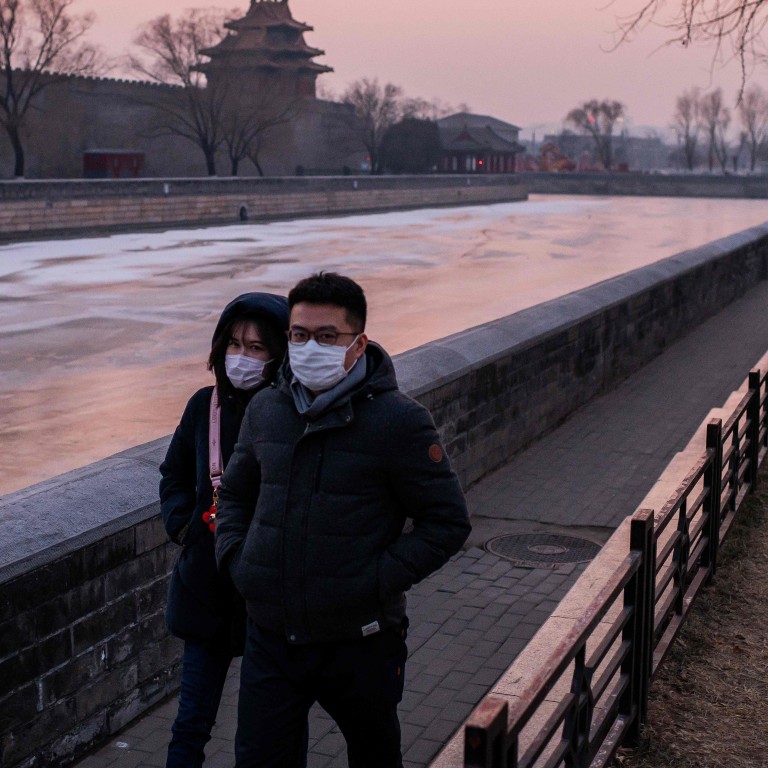
Valentine’s Day flower trade wilts in China as businesses take hit from coronavirus outbreak
- It’s usually the busiest time of the year for florists, but ‘80 per cent of flower shops and markets have been forced to close’
- Many people have had to cancel plans amid lockdowns and other measures to contain the outbreak
Florist Zhong Wenping is usually racing around at this time of year, preparing for Valentine’s Day. But this year her flower shop in Jingshan, a small city in central Hubei province, is quiet.
“It should have been the busiest day of the year for me because the Lunar New Year holiday is over and everyone should have been back to work,” Zhong said.
“I should have started preparing roses a week ago, but people haven’t been able to leave their homes since late last month – let alone do any celebrating,” she said. “Also, how can you really sterilise flowers?”
It was a bleak Lunar New Year, and now the outbreak is forcing couples to cancel their Valentine’s Day plans. In Beijing, white-collar worker Karen Wang and her husband had planned to take the new high-speed train to Zhangjiakou, about 190km (118 miles) northwest of the capital.
The city will be a host of the Winter Olympics in 2022, and the pair planned to spend Valentine’s Day at a ski resort there, then travel to the Inner Mongolian capital Hohhot for the weekend.
“I was so excited when the high-speed train was launched in late December because it takes less than 50 minutes to get to Zhangjiakou,” Wang said. “But now I’ve had to cancel everything because of the outbreak.”
Instead they will stay in Beijing, where – like many other places in China – the streets are deserted, although some people have returned to work after the holiday, and those who can are working from home. Some shopping malls in the capital are open, though with reduced hours and notices at the entrances reminding customers to wear masks.
Big cinema releases have also been postponed. Columbia Pictures announced earlier this month that Oscar-winner Little Women would not hit Chinese cinemas as planned on February 14. The release of Marriage Story, another Oscar-winner due to be screened from February 28, will also reportedly be delayed.
Many businesses are struggling across China as the crisis unfolds, but those in the flower trade have been particularly hard hit at their busiest time of year.
Pang Jun owns a flower business in the southwest city of Kunming, home to Asia’s largest flower market. He usually sells 1 million roses on Valentine’s Day. This year, he has orders for 40,000.
Worse, the average price is down by 75 per cent – so he gets 0.50 yuan (7 US cents) for a rose instead of 2 yuan (28 US cents).
To work or not to work: the difficult coronavirus question facing China
“About 80 per cent of flower shops and flower markets in the country have been forced to close because of the coronavirus outbreak,” Pang said. “Unlike vegetables, flowers are not necessities of life, so the flower industry is more vulnerable.”
But some Chinese are quietly relieved about the disruption to the most romantic day of the year.
James Chen, a student in Beijing, said the outbreak gave him a “good excuse” not to feel too much pressure on Valentine’s Day.
“I probably would have planned something, but because of the virus everything has changed,” he said. “We won’t be doing the usual thing of going out to a restaurant, so I will probably come up with something more creative.”
Office worker Wu Gang, who is also in Beijing, agreed. “Most men, including me, hate this festival,” Wu said. “But usually we’re forced to celebrate it.”
This year he will do something new. “Going to a restaurant or buying flowers, it always ends up being about showing off photos on social media,” he said. “My plan is to write a love letter to my girlfriend – I think she’ll love it.”
Purchase the China AI Report 2020 brought to you by SCMP Research and enjoy a 20% discount (original price US$400). This 60-page all new intelligence report gives you first-hand insights and analysis into the latest industry developments and intelligence about China AI. Get exclusive access to our webinars for continuous learning, and interact with China AI executives in live Q&A. Offer valid until 31 March 2020.

